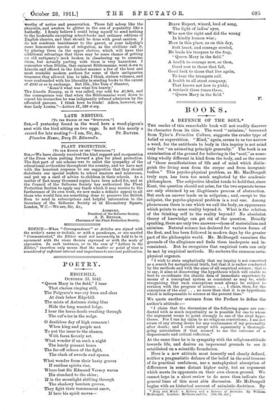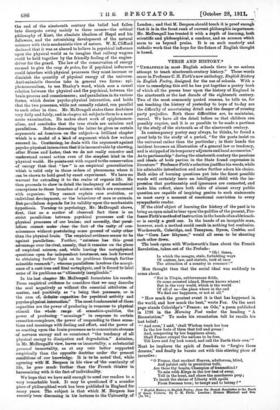BOOKS.
A DEFENCE OF THE SOUL.* THE reader of this remarkable book will not readily discover- its character from its title. The word "animism," borrowed.
from Tylor's Primitive Culture, suggests the cruder type of belief or superstition. "Mind," again, seems to us too nar•r•ow
a word, for the antithesis to body in this inquiry is not mind only but "an animating principle generally." The book is an examination of the ground for believing in the "soul," as some- thing wholly different in kind from the body, and as the cause- of "those manifestations of life and of mind which distin- guish the living man from the corpse and from inorganic bodies." This psycho-physical problem, as Mr. MacDougall.
truly says, has been too much neglected by the academic- philosophers. The subjective idealist tends to hold that, since- Kant, the question should not arise, for the two separate terms.
are only obtained by an illegitimate process of abstraction. But such an answer lands us in solipsism ; and, except to the- solipsist, the psycho-physical problem is a real one. Among phenomena there is one which we call the body, an appearance which points to some reality beyond it. What is the relation. of the thinking self to the reality beyond P No absolutist theory of knowledge can get rid of the question. Broadly- speaking, there are only two answers—those of materialism and animism. Natural science has declared for various forms of the first, and has been followed in modern days by the greater part of the philosophic world. Mr. McDougall examines the grounds of the allegiance and finds them inadequate and in- consistent. But he recognizes that empirical teats can only be met by empirical methods. He eschews the common meta- physical organon.
"I wish to state emphatically that my inquiry is not conceived as a search for metaphysical truth, but that it is rather conducted by the methods and with the aims of all empirical science ; that is . to say, it aims at discovering the hypotheses which will enable us best to co-ordinate the chaotic data of immediate experience by means of a conceptual system as consistent as may be, while recognizing that such conceptions must always be subject to • revision with the progress of science.. . . I claim, then, for the- conception of the soul . . . no more than that it is an hypothesis which is indispensable to science at the present time."
We quote another sentence from the Preface to define the author's attitude :—
" I claim that the discussions of the following pages are con- ducted with as much impartiality as is possible for one to whom- the argument seems to point strongly to one of the rival hypo- theses. For I can lay claim to no religious convictions ; I am not aware of any strong desire for any continuance of my personality after death; and I could accept with equanimity a thorough- going materialism if that seemed to me the outcome of a,. dispassionate and critical reflection."
At the same time he is in sympathy with the religious attitude towards life, and desires on impersonal grounds to see it:. established on a scientific foundation.
Here is a new attitude moat honestly and clearly defined, neither a pragmatistic defence of the belief in the soul because of its practical usefulness, nor a metaphysical absorption of differences in some distant higher unity, but an argument which meets its opponents on their own chosen ground. We
cannot hope in a short review to do more than indicate the- general lines of this most able discussion. Mr. McDougall begins with an historical account of animistic doctrines. By
• Body and Mind r a History and a D•fenes of Animism. By William. McDougall. London: Methuen and Co. [10s. 6d. net.] the end of the nineteenth century the belief bad fallen into disrepute owing mainly to three causes—the critical philosophy of Kant, the absolute idealism of Hegel and his followers, and the astonishing development of the natural sciences with their mechanistic view of nature. W. K. Clifford declared that it was as absurd to believe in psychical influence -upon the physical world as to imagine that railway wagons could be held together by the friendly feeling of the engine. driver for the guard. The law of the conservation of energy seemed to give the coup de grace, for if psychical influences could interfere with physical processes they must increase or diminish the quantity of physical energy of the universe. Anti-animistic theories take in general two forms : epi- phenomenalism, to use Huxley's word, which sees a causal :-elation between the physical and the psychical, between the brain-process and consciousness ; and parallelism in its various forms, which denies psycho-physical interaction, and holds that the two processes, while not causally related, run parallel to each other in time. Mr. McDougall states these doctrines very fully and fairly, and in chapter xii. subjects them to a most acute examination. He makes short work of epiphenomen- -alisru, and concludes that the true rivals are animism and parallelism. Before discussing the latter he gives us certain .argumenta ad. honsinena on. the subject--a brilliant chapter -which is a model of a kind of argument which few writers succeed in. Continuing; he deals with the argument against psycho-physical...interaction, that it is ineonceivable by showing, -after. Hume and Lotze,, that- we do not really conceive and understand causal action even of the simplest kind in the physical world. Heepointeent with regard to the conservation -of energy that that " law " is an empirical generalization which is valid only in those orders of phenomena where it can be shown to hold' good by exact experiment We have no 'warrant for extending it to. the realm of organic life. He then proceeds to show in'detail the inadequacy of mechanical conceptions to those branches of science which are concerned with organism. They cannot explain race evolution, or -individual development, or the behaviour of men or animals. Butparallelism depends, for its validity upon the mechanistic hypothesis. Turning- to psychology, Mr. McDougall shows, first, that as a matter' of observed fact there is no .strict parallelism between psychical processes and the physical processes of our brains -1 and secondly, that paral- lelism carmot make; clear' the- fact of the unity' of con: eciousness without postulating some ground of unity other than the physical brain. The empirical evidence seems to be against parallelism. Further, "animism has this- great -advantage over itsirival, namely, that it remains on the plane of empirical science,, and, while leaving the metaphysical .questions open for independent treatment, oast look forward to obtaining further light on its problems through further scientific research" ; whereas parallelism involves' the accept- ance of a cast-ircar and final metaphysic, and is forced to label some of its problems mu" ultimately inerplicable."
In his last chapter Mr. McDougall formulates his results. From empirical evidence- he considers that we may describe the soul negatively as without the essential attributes of matter, and positively as "a being that possesses, or. is the sum of, definite- capacities for psychical activity and psycho-physical interactican" The most fundamental. of these capacities are the power of producing in response to physical stimuli the whole range of- sensation-qualities, the power of producing " meanings " in response to certain sensation-complexes, the power of responding to these sensa- tions and meanings with feeling and effort, and the power of so reacting upon, the, brain-processes as to concentrate streams, -of nervous energy and so counteract "the tendency of all physical energy to dissipation and degradation." Animism, in Mr. McDougall's view, leaves us immortality, a substantial personal immortality, as at any rate better supported empirically than the opposite doctrine under' the- present -conditions of our knowledge. It is to-be noted that, while agreeing with M. Bergson in his view, of the continuity of life, he goes ranch further than the. French thinker in harmonizing with it the fact of individuality.
We hope that we have said enough to send our readers to a very remarkable book. It may be questioned if a sounder piece of philosophical work has been published in England for many years. The subject is that which M. Bergson has recently been discussing in his lectures to the University. of London ; and that M. Bergson should tench it is proof enough that it is in the front rank of current philosophic importance. Mr. McDougall has treated it with a depth of learning, both scientific and philosophical, a candour, and an acumen which seem to us beyond praise. It is on such masterly and catholic work that the hope for the future of English thought is based.











































 Previous page
Previous page